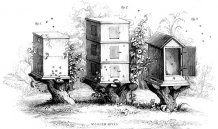Articles

Tell it to the Bees, by Louise Ann Wilson, is a walking-performance which takes place on 14 August
Meet Exeter’s bees, create GPS embroidery and explore the city’s maritime history at outdoor events
People can meet Exeter’s bees, create embroidery using GPS technology and explore the city’s maritime history at a series of innovative outdoor events this summer.
Artists have developed unusual ways to bring audiences together safely and new approaches for people to enjoy the arts together.
The outdoor performances have been commissioned by University of Exeter academics who are leading a major research project into outdoor performances. Their work will show how city centres can ’build back better’ after the coronavirus pandemic in performances that think about new relationships with their audiences and pay attention to urban ecologies.
The study is led by Evelyn O’Malley with Cathy Turner, Tim Coles and Giselle Garcia. Project partners are Exeter City Council and Exeter Culture and it is funded by a UKRI AHRC covid-19 rapid response grant.
Researchers asked the artists to create performances on environmental themes, celebrating connections with nature and the pleasures of sustainability.
Professor Turner said: “We often focus on the things we need to give up, rather than on the joys of more sustainable lifestyles. We were inspired by Kate Soper’s idea of an ‘alternative hedonism’, and the contribution performance can make to a positive, flourishing environmental movement.”
Dr O’Malley said: This promises to be an important summer for open air performance. We are interested in the ways in which innovative artists in that sector have come up with new ways of working inspired by the pandemic. The performing arts have been badly hit by lockdown, with so many artists working as freelancers. However, the outdoor sector can lead the way to cultural renewal this summer.”
Tell it to the Bees, by Louise Ann Wilson,is a walking-performance which takes place on 14 August, starting on the roof garden of the Princesshay Shopping Centre in the heart of Exeter, where there are four beehives. Participants in small groups will be introduced to the honeybees by the beekeepers and then follow a map of a route around the city visiting a number of bee-stations along the way. As they move from station to station they will be drawn further into the world of the bee and discover the significance of the age old practice of sharing stories of important life-events or worries with the bees. The event is designed to allow participants to reflect upon life-events experienced during the COVID-19 pandemic and recovery.
Louise Ann Wilson is an artist, scenographer and researcher who creates site-specific walking-performances, films, installations and book that give-voice to ‘missing’ or marginal life-events – with transformative and therapeutic outcomes.
Exeter at Sea, on 7 and 8 August, sees artists Sheila Ghelani and Sue Palmer map a route inspired by The Exeter, an East India Company ship which made eight voyages from the UK to Bengal and China via St Helena around southern Africa, and back. This will be a local and international heritage tour, with Sheila and Sue showing how the colonial history of Exeter intersects with histories of plants and landscape.
Sheila Ghelani and Sue Palmer both work individually as artists whose work spans performance, audio and moving image. Each artist's practice centres on using research to make artistic work with detail and resonance, for public places, made for the passer-by or the guest. They were last in Exeter in 2019 when they shared Common Salt, their collaborative show and tell on nature, empire and memory at Southernhay House - presented by Scare the Horses.
GPS Embroidery: Acts of (in)visible repair, by Lizzie Philps, starting in the week of 19 July, uses hand held GPS devices to ‘stitch’ a line across the map. The project explores unseen but essential “invisible” networks within the urban environment of Exeter, and asks how we can care for them best. Women and girls from three different parts of the city will be invited to help create GPS ‘embroideries’ that draw attention to places we need to care for, marking a pattern electronically through walking. Through community mapping and “walkshops”, participants will share the small but important ways people can help biodiversity to thrive.
Lizzie Philps (a University of Exeter Drama alumnus) makes participatory performance projects, including theatre, installations, site-based and walking events. The work is playful and irreverent, and explores the sensory, the landscape, and the ways audiences can create and negotiate meaning together.
Professor Turner said: “Each of these artists has a fantastic track record of working in outdoor spaces and we hope to learn from their example, to establish guidelines for best practice and to understand the possibilities for a shift in leisure activities towards greater appreciation of urban ecologies.
“These will be really fun, thought-provoking events where people can explore Exeter and meet leading artists.”
For updates on how to book, see https://openairperformance.com/our-commissions//.
Date: 29 June 2021
